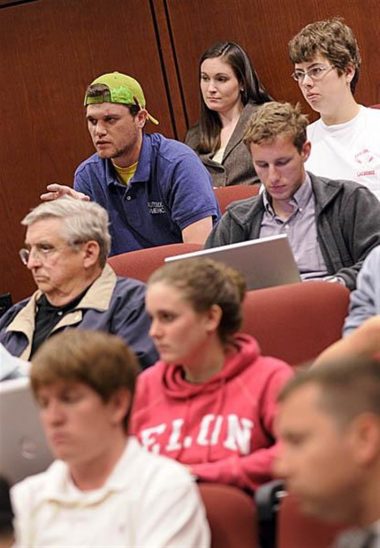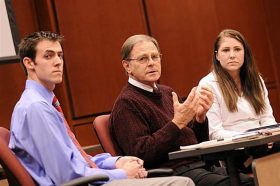A series of events at Elon University this week highlighting the costs of war in Iraq concluded Thursday with a community discussion where students, staff and members of the public shared their struggles in dealing with the moral issues of U.S. actions overseas.

After three nights of learning from guests, the March 6 panel discussion in the LaRose Digital Theatre allowed students a chance to ask questions – and share thoughts – about the Iraq War and terrorism in general.
The talk opened with reflections from two students – seniors Mike Donofrio and Julie Kenneally, both political science majors – and the Rev. Richard McBride, the university chaplain. McBride told the 50 people in the audience about his son, a U.S. Army attack helicopter pilot who returns to Iraq this fall for his second tour.
McBride said he is concerned that “the soul suffers” in many soldiers who are trained to kill for a mission that was launched on false premises. “I don’t see that the violence has achieved the peace that we were told that it would,” he said.
Donofrio, a former intern at the Pentagon, said he believes that the term “war” has lost its impact. He cited the “War on Drugs” and the “War on Poverty” as two public policies that dilute the word.
“We’ve lost touch as a people to what it means,” Donofrio said. Part of that, he said, is that this war has not required much sacrifice by the American public. “We’ve lost touch as a community with what happens abroad.”
Kenneally said that younger Americans don’t seem to pay as much attention to the war because, instead of being a constant presence in media and daily life, students must seek that information themselves.
“I started out not caring at all,” she said. “I was completely apathetic in high school.”
Audience members suggested a mandatory draft has not focused as much youth attention on the war as was seen in the Vietnam era four decades ago.
To watch a short video segment of the talk, click on the link below.




